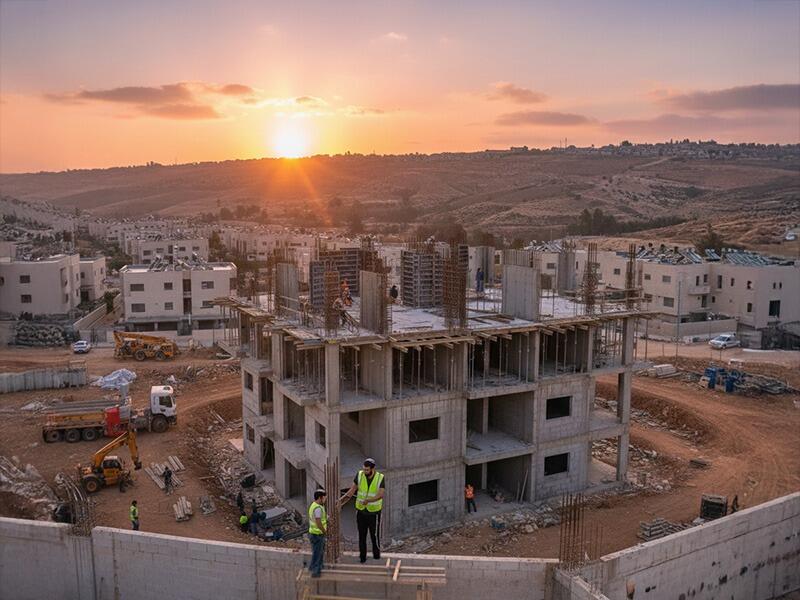Of course, it is preferable not to employ those who oppose our existence in this Land ● However, as long as there is no practical alternative, it is forbidden to halt the building of our land ● Our goal is to reach two million Jewish residents in Judea and Samaria; delaying construction could cause us to fail through the Sin of the Spies ● In the future, the nations will come to learn from us how the tzitzit (ritual fringes) express the ability to bring holiness into ordinary daily life ● It is an act of piety to check the tzitzit before reciting the blessing, but in our day, there is no need to delay because of it, if there is no reasonable concern that they have torn
A Question Regarding Building in the Settlements
Q: Rabbi, I understand that your opinion is that it is necessary to build in Judea and Samaria, even when employing Arab workers. But it is well known that they hate us and fight us, and when we build with them, we strengthen their hold on the Land. Therefore, the settlements that oppose employing Arabs are correct!
Furthermore, the only argument of those who support employing Arabs is financial—to make construction cheaper. If so, the rabbis should educate the public to overcome the desire for money and be willing to pay more, rather than employ Arabs! Not only that, but if Arabs were completely prevented from working, innovative solutions would be found to lower construction costs, and thus Israel would be doubly blessed.
A: Those who wish to build in Judea and Samaria with Arab laborers aim to settle the Land, and expand Jewish settlement in Judea and Samaria as quickly as possible. The higher housing prices rise, the fewer buyers there are, and the settlement process slows down. In addition, there are currently not enough workers to build at the required pace. Although employing hostile Arabs strengthens our enemies, we ourselves gain much more strength from it.
Naturally, everyone would prefer to give work to his own people, and certainly not to workers who are not supportive of our existence in this Land. However, the challenge of changing construction methods, and the identity of the labor force, is a national challenge that only the government of Israel can handle. Around the world there are hundreds of thousands of construction workers who would gladly receive work visas from Israel to work in the construction industry. If various barriers—such as laws and regulations about minimum wage—were removed, construction could progress much faster, and at lower prices.
However, the position of successive Israeli governments, based on the view of the security services, is that it is important to provide work for Arab construction workers from Judea and Samaria. Many believe this position is mistaken and reflects the same conception that led to war and its failures. Therefore, those who oppose this approach should work to change the stance of the security establishment and government—but this must be done politically, not by delaying construction.
Another possible way forward is to improve construction methods based on international experience, adding Israeli innovation. May we find entrepreneurs who will do this. In the meantime, however, we must build as quickly and as cheaply as possible, in order to settle the Land, and prevent the terrible danger of a hostile state in the heart of our country.
Beware of the ‘Sin of the Spies’
Those who call to delay construction must be careful, to avoid falling even into the slightest trace of the ‘Sin of the Spies’. The Spies did not intend to be wicked, to violate the commandment of Yishuv Ha’Aretz (settling the Land of Israel), or to harm Am Yisrael. They had what seemed a strong argument: that conquering the Land would endanger the nation. Since they were sent with God’s approval, they thought it their duty to dissuade the people from undertaking a mission beyond their ability.
Similarly, those who did not immigrate to the Land of Israel when the major waves of immigration began about 120 years ago also had arguments: that one must not cooperate with secular Jews, that the Jewish community was forced to employ Arabs, or that it depended entirely on foreign rule and the Baron’s money.
So too today, regarding building with Arabs — there are arguments with some justification, but in the larger picture, they miss the great goal of Yishuv Ha’Aretz and repelling the enemy. Heavy pressures are still being exerted on the State of Israel, and if we do not reach two million Jews or more in Judea and Samaria as quickly as possible, we will fail to fulfill the commandment and the duty imposed upon us.
Incidentally, it is worth noting another point: often those who call to halt construction have already bought cheap homes built by Arab workers, and now they demand that Arab labor stop, thereby raising housing prices by tens of percent for new settlers—without feeling the slightest pang of conscience. It is unfair to take a position that demands others pay a higher price, while not volunteering to share that burden themselves.
The Tzitzit Reminds of All the Commandments
As we learned in the previous column, the commandment of tzitzit represents all the commandments. The purpose of all mitzvot is to guide a person in expressing his inner powers in the proper and blessed way. The tallit with its four corners symbolizes all the latent powers within a person, and the many threads emerging from it symbolize bringing those powers into action. Thus, the mitzvah of tzitzit reminds us of all the commandments, as it is written:
“And you shall see it and remember all the commandments of the Lord, and do them” (Numbers 15:39).
As our Sages taught: “Seeing leads to remembering, and remembering leads to doing” (Menachot 43b). Seeing the tzitzit therefore reminds one of all the mitzvot, whose purpose is to bring the inner powers of a person to fruition.
From Noah and Abraham
Our Sages asked: from where did Israel merit the honorable garment of tzitzit? They answered: from Shem, the son of Noah. When Noah became drunk and was disgraced, Shem and his brother Japheth covered their father so that he would not be shamed. God rewarded Shem’s descendants by giving them the commandment of tzitzit, which brings beauty and splendor in this world and the next (Pirkei deRabbi Eliezer 14).
Japheth, who participated to a lesser extent, merited that his descendants would have proper burial and their bodies would not be disgraced (Genesis Rabbah 36:6).
Others say that Israel merited tzitzit because of Abraham our father, who rescued the people of Sodom from the four kings and could have taken their possessions but chose not to benefit “from a thread to a shoe strap” (Genesis 14:23). In that merit, his descendants received the great honor of the threads of tzitzit (ibid., Sotah 17a).
Noah was the pioneer in developing the powers of the seventy nations, while Abraham pioneered the development of the powers of Israel. Therefore, Israel merited the mitzvah of tzitzit through them.
A Message to the Nations
The idea expressed in tzitzit—that through practical commandments, Israel learns to express its inner good—will one day become a message for all humanity. This is the meaning of our Sages’ words:
“Whoever is careful with tzitzit will merit that 2,800 servants attend him, as it is said: ‘In those days, ten men from all the languages of the nations shall take hold of the corner of a Jew’s garment, saying, We will go with you, for we have heard that God is with you’” (Zechariah 8:23, Shabbat 32b).
Ten men from each of the seventy nations grasp each corner—700 per corner, 2,800 total.
The term “servants” here does not mean in a degrading sense, but rather people who understand that without the guidance of the Torah, man becomes enslaved to the material world, unable to actualize his spiritual potential. They recognize the greatness of Israel, who are careful with tzitzit, and devoted to redeeming the latent powers within humanity and the world. They wish to attach themselves to Israel to learn how to realize their own gifts, and bring blessing to themselves and their nations (based on Maharal, Chiddushei Aggadot, Menachot 43b; Ein Ayah, Shabbat 2:221).
We may add that the nations’ admiration for tzitzit—a garment everyone wears, yet which Israel has made sacred—conveys a profound message: that all aspects of ordinary life can be elevated to holiness.
Must the Tzitzit Threads Be Separated?
Our Sages (Menachot 42a) said the tzitzit threads should be separated. The Tur (Orach Chayim 8:7) explains that tzitzit derives its name from the word meaning “separate threads.” However, separation is not essential to the mitzvah, and one should not miss communal prayer because of it (Magen Avraham 8:10; Eliyah Rabbah 8; Shulchan Aruch HaRav 12; Mishnah Berurah 18).
When the threads are good quality, as they are today and do not tend to tangle, there is no need to spend time separating them (Aruch HaShulchan 13). But if they have become entangled, for example after washing, one should separate them.
Checking the Tzitzit Before the Blessing
Q: Must one check the tzitzit before saying the blessing?
A: In the past, tzitzit threads were less durable and often tore without the wearer noticing. Therefore, the Rosh wrote: “One who is fearful of God should check the tzitzit before wrapping himself, lest he recite a blessing in vain” (Hilchot Tzitzit 20). Likewise, the Shulchan Aruch rules: “Before blessing, he should inspect the tzitzit threads to ensure they are valid, so as not to bless in vain” (Orach Chayim 8:9). Some say this inspection is also for the sake of fulfilling the mitzvah properly (Mishnah Berurah 22).
However, this is an act of piety, not obligation, since we assume the tzitzit remain intact unless proven otherwise (Responsa Zera Emet III:142; Aruch HaShulchan 8:14–15). Many great Torah scholars did not follow this pious practice (Yechaveh Da’at VI:1). Therefore, one who is in a hurry to join communal prayer, or to be called to the Torah, need not delay to check his tzitzit (Magen Avraham 8:11; Taz 13:3; Ben Ish Chai, Bereishit 3; Mishnah Berurah 8:22).
The pious custom of checking applies only when threads often tear unnoticed (Turei Zahav 8:8; Magen Avraham 8:19). Nowadays, since most people’s tzitzit threads do not tear easily, there is generally no need to check them before the blessing.
Nevertheless, one who suspects that his tzitzit may have torn—for example, after heavy activity, such as labor or military training—should check them before blessing.
This article appears in the ‘Besheva’ newspaper and was translated from Hebrew.








